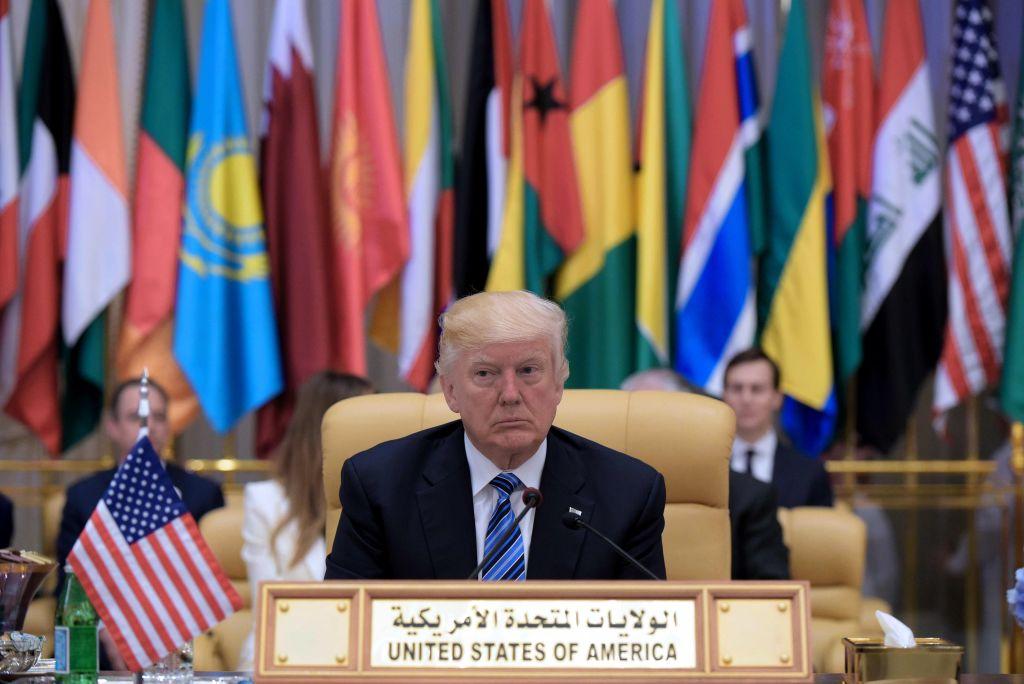Donald Trump's budget proposal slashes Middle Eastern aid funding by 80% while he visits the region
Despite paying lip service to building ties with Muslim nations, the new administration is seeking to cut £656 billion of current assistance to Middle Eastern and North African countries

Donald Trump was the guest of honour at a summit in the Saudi Arabian capital of Riyadh last week attended by the kings, clerics and other representatives of 50 Muslim nations.
While the US president delivered what he said was a “message of friendship and hope and love” to the Arab world, it appears Mr Trump is not willing to put his money where his mouth is: on Tuesday his administration moved to slash its Middle East and North Africa aid budget by up to 80 per cent.
Mr Trump reiterated his desire to build a safer and more prosperous world, and strike the “ultimate deal” of Arab-Israeli peace during his four-day stint in Saudi Arabia, Israel and the West Bank, during which he paid his respects at Jerusalem’s holy sites.

But as he and wife Melania boarded Air Force One on the fourth and final day of the Middle East leg of his maiden trip abroad as president, back in Washington DC, 2018 fiscal year proposals released by the White House unveiled proposed drastic cuts to the US’ diplomacy and foreign aid budgets.
The plans, first announced in March, aim to reduce spending on the State Department and USAID by 28 per cent, while increasing funds for military programmes.
Under the budget proposals the Palestinian Territories would receive a 4.6 per cent rise for both the West Bank and Gaza - a total of $215m (£168m) for fiscal year 2018 - and Israel’s current $3.1bn (£2.4bn) security aid package preserved.
Syria, Iraq and Libya would also receive increased aid spending, the 400-page proposal says, as the administration seeks to more closely link aid with the US’ national security objectives.
Overall, though, Middle East and North African countries would see their assistance slashed by $850 million (£656 million), estimates from thinktank the Project on Middle East Democracy said.
The planned budget “acknowledges that US diplomacy engagement and aid programmes must be more efficient and more effective, and that advancing our national security, our economic interests, and our values will remain our primary mission,” Secretary of State Rex Tillerson said in a statement.
Almost half of the money currently earmarked for economic development would be axed, while anti-terrorism and military training resources would be kept.
While Jordan’s King Abdullah is the only Middle Eastern leader to have been invited to meet the president in DC twice so far, Jordan - which hosts more than 1.4 million Syrian refugees - would have its aid slashed by 21.7 per cent.
Lebanon, where one in four of the population is now Syrian, would have its budget cut by 22.7 per cent, and Yemen - currently embroiled in a two-year-long civil war, and where the UN estimates more than half of the 27million strong population is food insecure - would see its aid reduced by 16.8 per cent.
Morocco would also be badly affected by a security assistance drop by 65 per cent and economic assistance cut by one third, as would Bahrain, which would see an 86 per cent drop in security assistance.
Other swingeing cuts target health programmes worldwide, which face a 25 per cent decrease in funding, as well as food security institutions, women’s issues programmes and climate change initiatives.
Some of the savings will go towards a new $200 million (£154 million) global military financial assistance budget to give the State Department the flexibility to shore up security where it sees fit, rather than tying the budget to loans and grants for specific countries.

Earlier this year more than 120 retired US generals and admirals wrote to Congress urging the body to fully fund diplomacy and foreign aid, arguing the functions were “critical to keeping America safe.”
Congress is highly unlikely to approve the Trump administration’s proposals in their current form.
The budget plans have already faced bipartisan opposition among politicians. Republican Senator Lindsey Graham called the leaked documents “dead on arrival".
Join our commenting forum
Join thought-provoking conversations, follow other Independent readers and see their replies
Comments
Bookmark popover
Removed from bookmarks